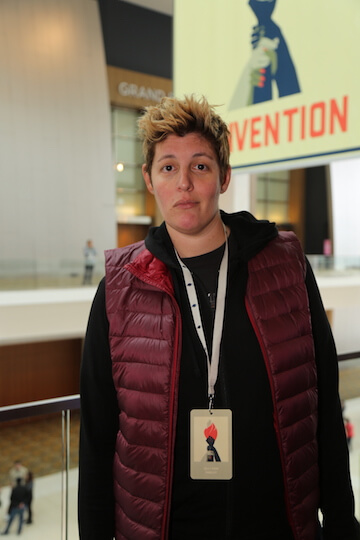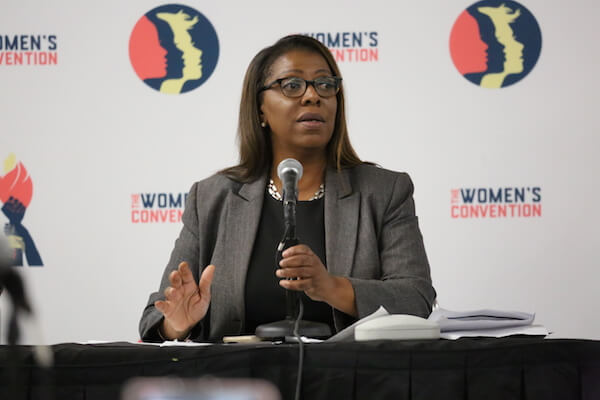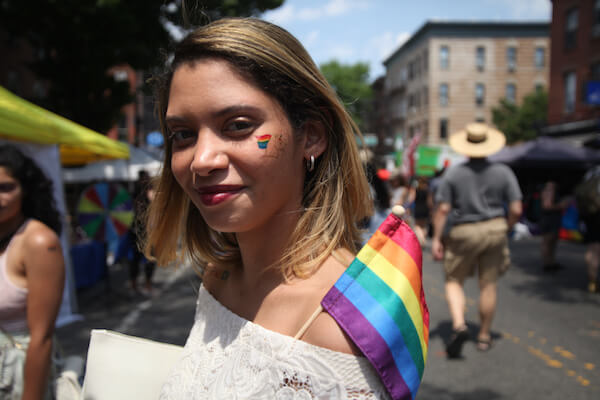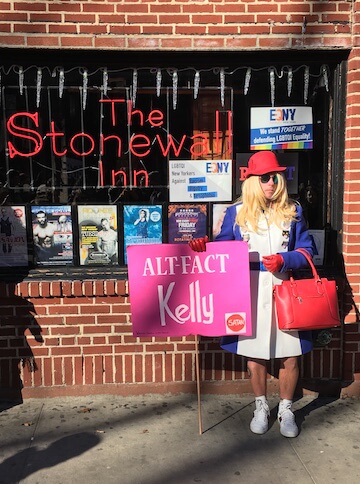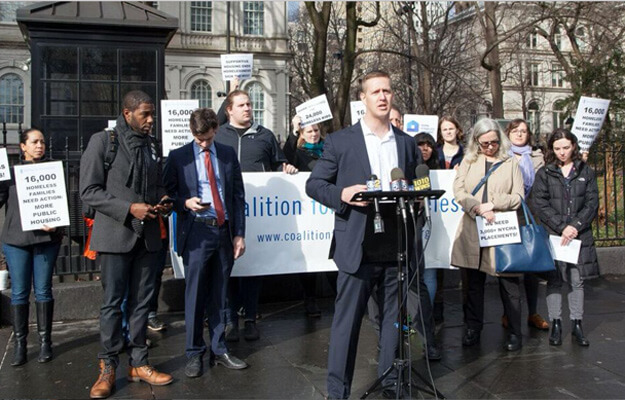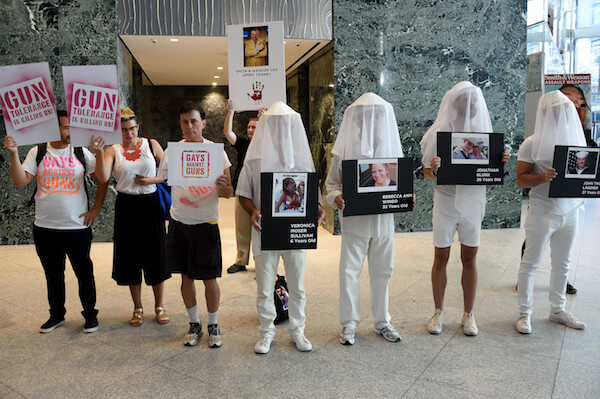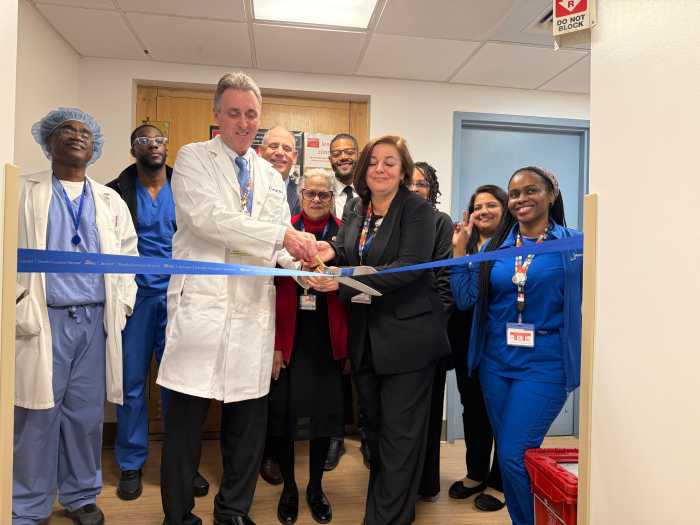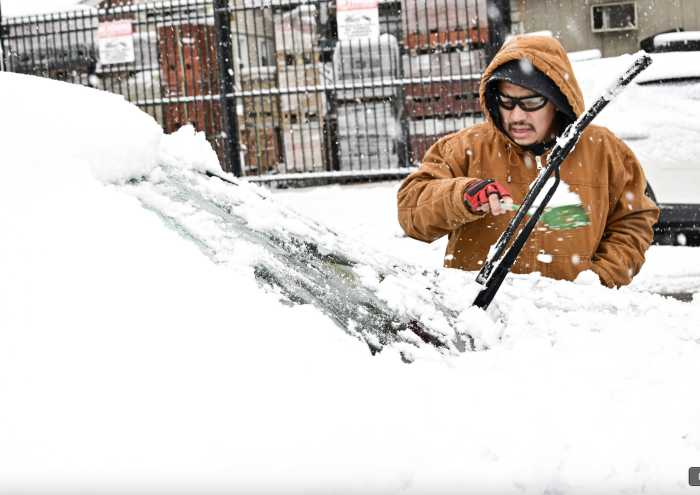California Congressmember Maxine Waters (second from right) with Women’s March and Convention organizers Linda Sarsour, Carmen Perez, Tamika Mallory, and Bob Bland. | MICHAEL LUONGO
Intersectionality.
It was a phrase used throughout the Women’s Convention, held in Detroit October 27 to 29. The Convention was a natural progression from the January 21 Women’s March, the response by women and their allies to the inauguration of Donald Trump that was held in Washington and other cities across the country and worldwide.
Nearly 4,500 were in attendance at the Cobo Center on the Detroit waterfront, a building best known for hosting the annual North American International Auto Show with a view of Canada across the Detroit River. The convention was nearly entirely female, cis and trans, with a smattering of men, those more often than not partners of female activists, Cobo staff, or journalists.
Detroit gathering late last month a next step from January 21 Women’s Marches
The convention was organized by the same quartet of New York women who were behind the January 21 march: Linda Sarsour, Bob Bland, Carmen Perez, and Tamika Mallory.
The most important political figure was California Congressmember Maxine Waters, whose own words, “reclaiming my time,” were echoed in the convention’s theme, “Reclaiming Our Time.” Described by activist Michaela Angela Davis, as “Auntie,” Waters was introduced by Mallory, who gave a preamble explaining that the controversial news that Bernie Sanders, the former presidential candidate, was to be the original keynote speaker was never true. Waters, honored during the Sojourner Truth Luncheon, gave a powerful speech, largely aimed at Donald Trump and other men in power whose policies hurt women.
Congressmember Maxine Waters keynoted. | MICHAEL LUONGO
“This is a man with no respect, with no values,” Waters said of the president.
She went on more forcefully, saying, “Donald Trump is the most dishonorable and despicable human being to ever serve in the office of the president. His declaration of being able to grab women by their private parts or his own history with sexual assault violations and disrespect of women is a kind of mentality that sends a message to men and young boys out there that if the president of the United States can get away with it, so can I. This president has no respect for women.”
Describing Trump’s comments about both Carly Fiorina and Hillary Clinton, Waters also admonished political consultants for advising female candidates not to respond by saying what is on their minds when insulted.
Michaela Angela Davis. | MICHAEL LUONGO
The #MeToo movement that re-erupted in the immediate aftermath of the Harvey Weinstein revelations was also a component of Waters’ speech, as she told the audience of “a record number of women who are boldly coming forward to reveal disturbing and grotesque acts of sexual harassment, assault, rape, often times at the hands of men who believed they were too rich and too powerful to ever be confronted.” She reminded the audience that it went beyond Hollywood, and was everywhere in America, even an issue for her colleagues in Congress. Other issues she touched on were healthcare, childcare, and equality for all women regardless of their race or social class.
As next steps, Waters said, “Let the world know from this day forward that the women in this convention, and all across the country, have had enough,” calling on everyone in Cobo to “organize a plan of action to continue our resistance,” and to “tell the world that the women in this country are reclaiming our time.”
More than 172 individual workshops, panels, and other talks were conducted throughout the three days of the conference. While LGBTQ topics were addressed in many of the events, several were focused directly on LGBTQ interests. These included a panel on publishing for women and non-binary writers, another called Safe Spaces for Queer Communities, and a transgender-focused panel called Not All Pussies Are Pink and Not All Women Have Pussies.
A major topic within this panel was the difficulty for trans people to find work. Freelance writer Katelyn Burns, a panelist, said, “Hire us to do things that aren’t trans-related — trans women shouldn’t have to feel the only way to survive is through sex work,” adding, “The only way I get paid to eat is if I write about trans stuff.”
Still, Burns emphasized, being trans was freeing.
LaLa Zannell, lead organizer at the New York City Anti-Violence Project, Raquel Willis of the Transgender Law Center in Oakland, and writer Katelyn Burns speak on a transgender-focused panel. | MICHAEL LUONGO
“When you come out as trans, you shuck off the chains that have held you your whole life,” she said. Burns said she felt organizers of the Women’s Convention could have included more trans women on other panels, rather than having only what she called a “Trans 101” discussion.
Raquel Willis of the Transgender Law Center was also on the panel and said, “My agenda is trans women and trans women of color being in every place.” She also acknowledged the visibility that her work affords her and said that more everyday trans women should be represented in the media.
“I want to show trans fully, other than just the advocates,” Willis said.
LGBTQ issues were also visible at the Social Justice City, where a wide range of organizations had booths. Among them was the Justus Business League, promoting a smartphone app where people can look up a company based on various factors including LGBTQ issues. The American Civil Liberties Union promoted transgender issues through pink and blue T-shirts, flags and even military patterned socks, a new product to raise money to fight the proposed transgender ban under the Trump administration. Rainbow-covered Spanish material promoted LGBTQ rights issues of interest and importance to immigrants.
New York City Public Advocate Letitia James speaks on a panel of elected officials. | MICHAEL LUONGO
Michaela Angela Davis also had her own booth, promoting her consulting and fashion advice firm Mad Free Life. Davis commented on the significance of Detroit as host city to a conference focused on intersectionality .
“There was a really big effort that it was grounded locally,” she said, adding, “I feel like the D was a guest or a host in a real way, like a character.”
Davis said she wasn’t certain that locating the conference in a city that is more than 80 percent African-American surrounded by suburbs with the country’s largest Arab and Muslim population necessarily accounted for the large turnout of black and Arab women, but noted that the success in drawing such a turnout created a special opportunity and challenge for white women in the audience. Black women she said, “should be here instructing and they [white women] should be here as students. We’ve been grandmothered into this work and not by choice. Black women gather and talk about strategy and how to work together in sisterhood all the time. We know how to do this, and it was white folks who elected Donald Trump. They have to do this work. If white people don’t do their part of the civil rights work, their humanity is at stake.”
In making that point, Davis was highlighting another theme of the Women’s Convention: the 53 Percent Problem — in recognition of the fact that more than half of the white women in the US voted for Trump. Tamika Mallory, one of the organizers, questioned white women at one point from the stage, asking, “We want to know what you were doing before the election.”
Commentator and organizer Sally Kohn, who founded Movement Vision Lab, a grassroots progressive think tank. | MICHAEL LUONGO
Perhaps the most prominent LGBTQ attendee at the convention was commentator and organizer Sally Kohn, on hand for a media training session. Kohn told Gay City News, “Intersectionality is a two-way street. Why doesn’t community XYZ show up for our issues? We also have to show up for other people’s issues.”
She added that people can have multiple identities which “merge together. But I think the transformation started happening when the theory of intersectionality caught up to people’s lived experiences, including for gay people to have a way to understand their multiple identities and express those identities.”
Many of those attending and speaking were from New York, including Letitia James, the New York City public advocate who was on a panel with other elected officials. She told Gay City News that as a New Yorker who already knew Trump before the elections, she was “surprised at the outcome and I am still surprised he is polling so well.” She added, however, that “progressives and people who care about this country, women in particular, are just rising up and there is just so much momentum and energy and that is what women claiming our time at this convention is all about.”
That LGBTQ issues needed to be included within the greater women’s movement was made clear by Mallory during the conference closing session, when from the stage she said, “We need to do better when it comes to our trans and LGBT community.” She also said that issues of concern to indigenous Americans are also often ignored by the movement.
Despite the sense of progress and energy palpable in Detroit, behind the scenes there were incidents making clear how much further women have to go to claim their time.
At a Saturday evening concert, an all-male battalion of guards encircled the stage, preventing women, including staff, from getting anywhere near the entertainers, even though the predominantly male press contingent, including this reporter, were given access. Rose McGowan, one of the most important celebrities in attendance who opened the convention by focusing on her fight against harassment of women in Hollywood, began to yell at one of the guards who would not let one of the convention’s female staff members through. “You’re a man, a man doesn’t tell a woman what to do,” McGowan shouted at one of them, her own face filled with anger, fierceness, and determination.
In the end, according to one of the staff members who spoke anonymously, “It took a man to talk to another man to resolve the issue,” and let the female staffer get to the stage.

